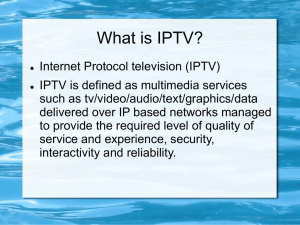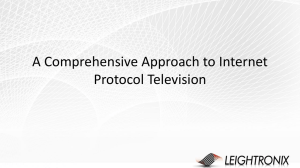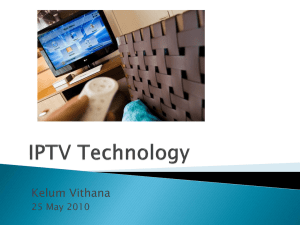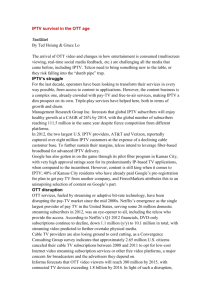IpTV
advertisement
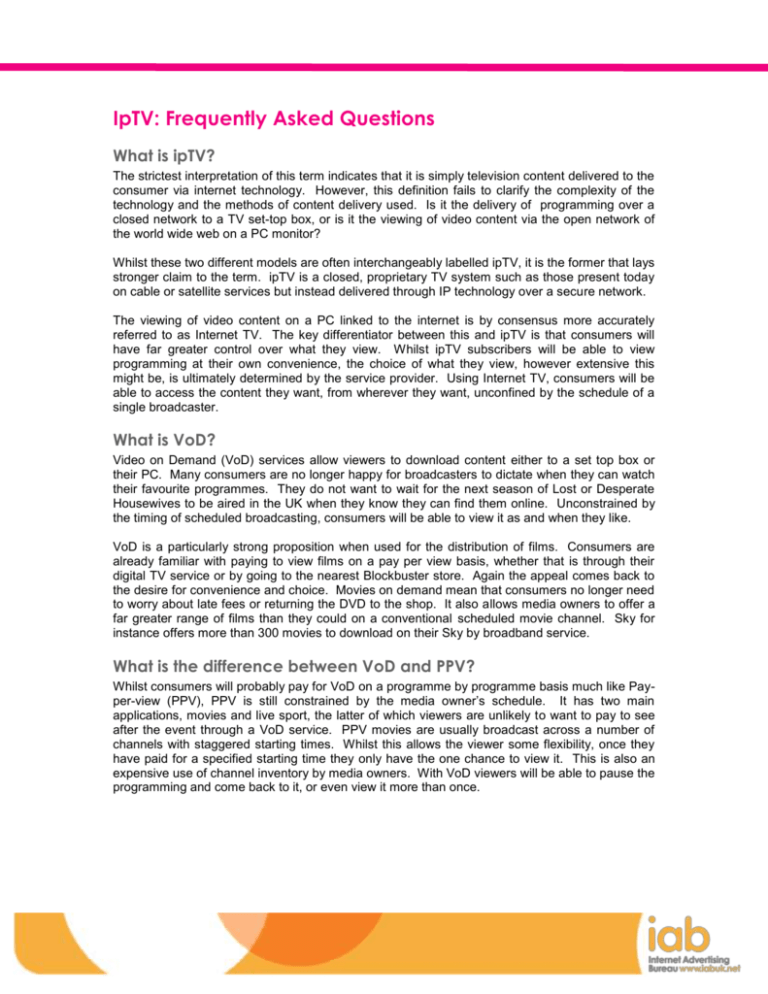
IpTV: Frequently Asked Questions What is ipTV? The strictest interpretation of this term indicates that it is simply television content delivered to the consumer via internet technology. However, this definition fails to clarify the complexity of the technology and the methods of content delivery used. Is it the delivery of programming over a closed network to a TV set-top box, or is it the viewing of video content via the open network of the world wide web on a PC monitor? Whilst these two different models are often interchangeably labelled ipTV, it is the former that lays stronger claim to the term. ipTV is a closed, proprietary TV system such as those present today on cable or satellite services but instead delivered through IP technology over a secure network. The viewing of video content on a PC linked to the internet is by consensus more accurately referred to as Internet TV. The key differentiator between this and ipTV is that consumers will have far greater control over what they view. Whilst ipTV subscribers will be able to view programming at their own convenience, the choice of what they view, however extensive this might be, is ultimately determined by the service provider. Using Internet TV, consumers will be able to access the content they want, from wherever they want, unconfined by the schedule of a single broadcaster. What is VoD? Video on Demand (VoD) services allow viewers to download content either to a set top box or their PC. Many consumers are no longer happy for broadcasters to dictate when they can watch their favourite programmes. They do not want to wait for the next season of Lost or Desperate Housewives to be aired in the UK when they know they can find them online. Unconstrained by the timing of scheduled broadcasting, consumers will be able to view it as and when they like. VoD is a particularly strong proposition when used for the distribution of films. Consumers are already familiar with paying to view films on a pay per view basis, whether that is through their digital TV service or by going to the nearest Blockbuster store. Again the appeal comes back to the desire for convenience and choice. Movies on demand mean that consumers no longer need to worry about late fees or returning the DVD to the shop. It also allows media owners to offer a far greater range of films than they could on a conventional scheduled movie channel. Sky for instance offers more than 300 movies to download on their Sky by broadband service. What is the difference between VoD and PPV? Whilst consumers will probably pay for VoD on a programme by programme basis much like Payper-view (PPV), PPV is still constrained by the media owner’s schedule. It has two main applications, movies and live sport, the latter of which viewers are unlikely to want to pay to see after the event through a VoD service. PPV movies are usually broadcast across a number of channels with staggered starting times. Whilst this allows the viewer some flexibility, once they have paid for a specified starting time they only have the one chance to view it. This is also an expensive use of channel inventory by media owners. With VoD viewers will be able to pause the programming and come back to it, or even view it more than once. Why isn’t there much content available online at the moment? There is a limit to the amount of quality content currently available on ipTV services in the UK. The main reason for this is that, until recently, the rights agreements have not been in place to allow media owners to distribute the programming in this manner. The combination of a reticent production community and the demand from a growing number of ipTV operators has hindered the deployment of services across the UK. However, following a period of difficult negotiation, and under pressure from Ofcom, a number of deals have recently been struck. The BBC has reached agreement with Pact, the trade association for independent producers, allowing viewers to catch up on any episodes of a series they’ve missed on-demand while the series is still going out. They will also be able to download programmes to view later within a seven day window. Channel 4 has maintained a more hard line stance through their negotiations and has secured a 30 day primary window, giving them greater flexibility to exploit programme rights. Importantly, they’ve also agreed a 5 month holdback period for Channel 4 commissions in order to prevent their programming from being sold on to rivals shortly after transmission. Now that these agreements have been met, the provision of content is likely to expand significantly. How will consumers find the content they are interested in, effectively and speedily? This is a challenge for media owners if they are to maximise the return on the wide breadth of content that they’ll make available, particularly for older or more niche programming. Personalisation will play a hugely important role, learning the viewing behaviour of users and being able to intelligently direct them towards relevant, interesting content. Whilst we may be moving towards a ‘schedule-less’ world where most media is consumed on demand, there will still be a role for the media owners to act in an editorial capacity. Consumers have built up trusted relationships with them and the media owners are ideally placed to help guide them to quality content. When is ipTV likely to have a decent reach? It is very difficult at this early stage to foresee how take up of ipTV services will progress, and no one is particularly sure of what the commercial opportunities will be. Informa Telecoms & Media predict that global ipTV subscriptions will reach almost 26m by the end of the decade, compared with just 2.7m at the end of 2005. UK subscriptions are expected to reach approximately 1.45m by this point, generating almost $800m in revenue. Will ipTV replace satellite and terrestrial TV? It is unlikely that ipTV will completely replace conventional forms of delivering programme content. The media owners themselves certainly aren’t planning to cast aside the investments they have made in their existing broadcast infrastructures. TV is still very effective at reaching mass audiences and ipTV subscriptions will not be sufficiently widespread for quite some time. Until full convergence occurs a number of years in the future, the two have every opportunity to work in tandem as part of an effective cross-media campaign. However, with the proliferation of ad-skipping technology, PVRs and increased viewer fragmentation, ipTV can provide a valuable addition to any media plan. What ipTV services are currently available? Home Choice made the first significant move into the ipTV market, offering both scheduled and on-demand programming through a set-top box. However, as a result of its very early entry into a market unready for its services, this is up for sale with substantial losses. BT are intending to launch their own ipTV service before the end of the year and other operators are likely to follow. Many companies are currently ‘testing the water’ with internet TV services. Traditional media owners such as channel 4, ITV and Sky are making certain programmes available on the internet, and online media owners such as MSN and AOL have launched video player services, offering selected content for free. The rights issues at play within the industry have affected the speed at which the market has developed. However, now these have been resolved, the amount of content available to consumers will increase dramatically. Why should advertisers consider using ipTV? IpTV presents the opportunity to combine the powerful brand-building effect of conventional TVquality advertising with the strengths of online; the ability to target specific audiences and allow consumers to easily pursue their interest in a product even to the point of purchase. There is also the straightforward argument that advertisers need to follow their audiences. As ipTV subscriptions grow, advertisers will need to ensure that their marketing messages are reaching this valuable segment. What ad formats are available? As ipTV is very much in its youth, there is no definitive or standardised advertising model in place. Using internet technology media providers will be able to completely revolutionise the traditional TV commercial break. Based on criteria such as age bracket, gender and income the targeting capability of online can be utilised to deliver relevant adverts to the right ipTV subscribers. Advertisers will have the option of either buying one slot for several of their products or the same slot with a number of other advertisers based on their target audience. Advertisers are also able to show their TV ads online, either before, during or after videostreamed content. Disney recently announced plans to introduce this model in the US, offering premium content to consumers for free, but including adverts that cannot be skipped. Within a web page containing ipTV content there is also the opportunity for the following: Streamed video advertising can be minimised to appear as a static button within the page as the programme content continues to play. Non-intrusive rich media adverts in the corner of the screen, which play throughout the programming. Banners/skyscrapers around the main programming, which may interact with the content at appropriate times. Advertising technology companies like Tangozebra and Eyeblaster are in the process of refining these models, and exploiting the technology available in order to find the most suitable ad formats for the medium. Brands such as Land Rover are also experimenting with brand-funded content, and we are likely to see an increase in this advertising method (as well as product placement) in the future. Advertisers need to ensure, however, that the content is not adversely affected by the promotion, and the marketing message is more subtle. What sectors are best suited to ipTV advertising? All sectors will be able to use ipTV advertising effectively. TV advertising based around internet technology can not only build brands but encourage a ‘call to action’ from the consumer. When watching content online or on a television delivered via IP, users will be able to freeze the programming in order to interact with any advertising that attracts their attention, submit their details for further information on a brand or in some cases make an online purchase. IpTV advertising could provide a gateway to internet advertising for sectors traditionally reluctant to embrace the medium. FMCG and retail brands for example will able to follow their audiences online using advertising methods they know and trust. How will companies make money from ipTV? There are two ways in which ipTV service operators will generate revenues, the first of which is through customer subscriptions. Depending on the services the media owner provides these could be in the form of regular payments much like the way consumers currently pay for their broadband connection or through one off payments for VoD content, or a combination of the two. Secondly, media owners will hope to generate revenues through advertising. They will of course need to grow their subscriber base and provide proof of the medium’s effectiveness if advertisers are to be persuaded to invest. Like iTV, isn’t ipTV unlikely to make a significant impact (on consumers, media owners and advertisers)? The success of PVRs and the growth of peer to peer technologies like BitTorrent are indicative of changing consumer behaviour as they move away from scheduled viewing to consuming more media on demand. IpTV technology provides the ideal solution, complementing people’s increasingly busy lives by allowing them to view programming as and when it suits them. Interactive TV is used primarily as an advertising format with relatively limited editorial content. Unlike ipTV, iTV is quite slow to navigate and the programme that the user is viewing continues to play in the background. For these reasons iTV is not a sufficiently compelling proposition for audiences and it has therefore not taken off to any great degree. The advertising opportunities that ipTV offers are far more flexible and sophisticated than anything possible with iTV and as more and more consumers take-up ipTV services the case for advertisers following them becomes even stronger. What is Triple Play? Triple play is the term used to describe a package of services that includes high speed internet access, television broadcasts and telephony all over a broadband connection. Triple Play services are offered by cable companies, telecommunication operators and dedicated home network companies like Homechoice. There have been a number of significant moves by these companies as they seek to gain advantage in the market, rolling out new services and acquiring other companies in order to improve their offering. Some companies, including NTL who have acquired Virgin Mobile, are also planning to offer mobile telephony in a ‘Quadruple Play’ package.



